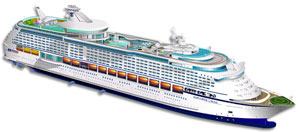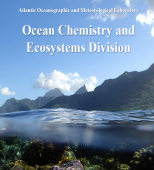About the Explorer of the Seas

On October 28, 2000 the Royal Caribbean International's ship, Explorer of the Seas, began weekly cruises from Miami, Florida, alternating between western and eastern Caribbean itineraries. In February 2002, the Ocean Carbon Cycle (OCC) group at NOAA's Atlantic Oceanographic and Meteorological Laboratory (AOML) installed an instrumental system to measure pCO2 in surface water in the Ocean Lab on the Explorer of the Seas. For more than five years, data was collected with the assistance of the full-time technician who maintained all the scientific equipment aboard the ship. In May 2006, the home port was changed to Cape Liberty Cruise Port, Bayonne, New Jersey. In addition, the cruise destinations started alternating between Bermuda and the eastern Caribbean, with an occasional excursion along the northeast coast of the USA and Canada.
During 2008, the scientific activities were converted to fully automated and unattended operation. The complexity of this transition reduced the pCO2 sampling to quarterly cruises for a year. The original pCO2 system was removed from the Ocean Lab and in June 2008, a new pCO2 analytical system was installed in the bow thruster space where the other seawater instruments were located. The new location was closer to the seawater intake and allowed the installation of an air inlet tube so that atmospheric CO2 measurements can be done in conjunction with the surface water pCO2 observations. These continued operations were greatly facilitated by the cooperation of the ship's officers and crew. While the ship is underway, the pCO2 analytical system takes 5 air and 65 water measurements every 3.2 hours. Data files are transferred to AOML electronically every day so that the system operation can be monitored. The final data are processed after a cruise is completed and then posted to international databases and to this web site.
This project represents a collaboration between AOML, the Royal Caribbean International (RCI) and the University of Miami's Rosenstiel School of Marine and Atmospheric Science (RSMAS) with financial support from the National Science Foundation, the Office of Naval Research, and the National Aeronautics and Space Administration. The frequently repeated tracks allow the detection of small changes in the oceanic and atmospheric CO2 concentrations that provide insights on monthly, seasonal, and longer time cycles. Further information about scientific observations aboard the Explorer of the Seas can be found at: http://oceanlab.rsmas.miami.edu.
About this Website
This web site provides access to the data collected on this ship. The processed data are organized by year and by cruise. For each cruise, the color coded fCO2 values are plotted along the ship's cruise track on a chart. Next to each chart are links to the comma-delimited data file and the associated Readme file. To download a data file, select the year from the drop-down list box and click on GO. Choose a chart and cruise, right-click on the link to its data file or Readme file, and select the download option.
The Master Readme link in the menu bar on the left provides meta data that is applicable for all data gathered from this ship. The individual Readme files next to the charts provide meta data specific to the associated cruise. The Realtime Display link displays plots of the raw xCO2 data as a function of time and location. These plots are suitable for monitoring but are not suitable for environmental interpretation since the Realtime data has not been processed nor quality controlled.
